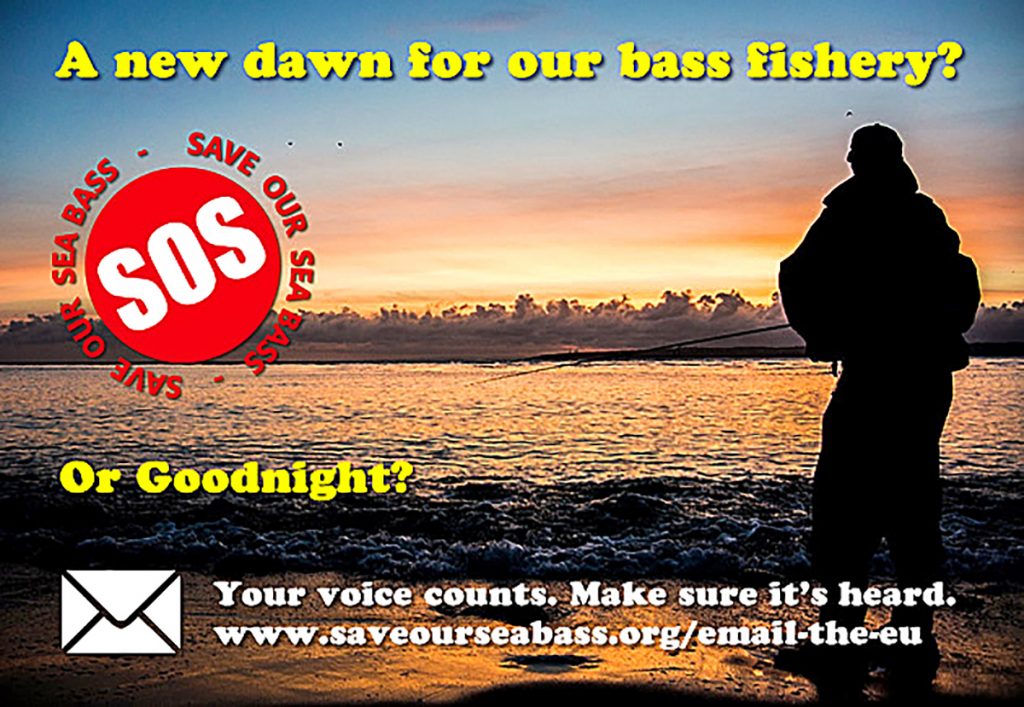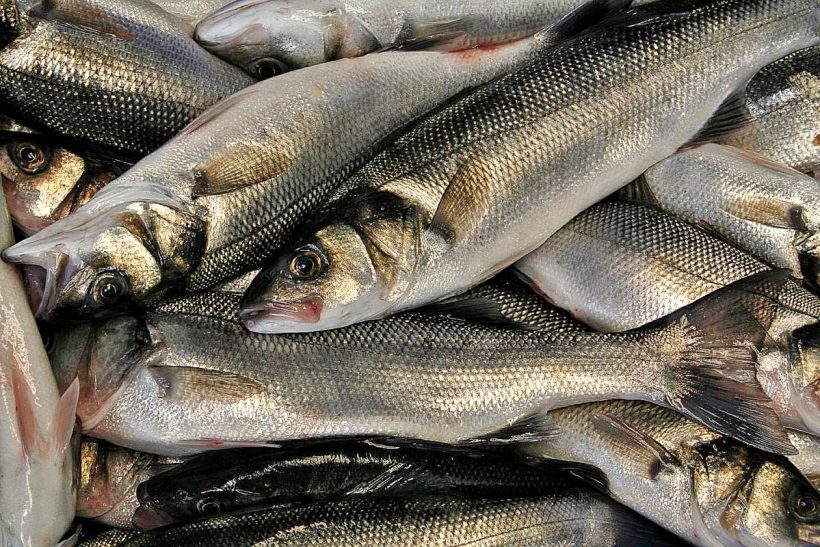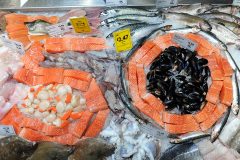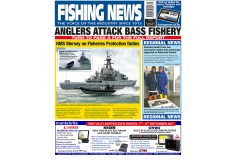SOS calls for further draconian measures to be imposed on commercial fishermen.
No consideration given to the time new management measures now in place need to work through -70% reduction in bass landings this year on south coast.
Bass anglers are calling on the European Commission to impose more draconian cuts on commercial bass fishermen in 2018, reports Tim Oliver.
Above: The poster Save Our Sea Bass (SOS) is using in its campaign calling for the EU to impose further cuts on commercial bass fishermen in 2018.
Save Our Sea Bass (SOS) is running a campaign urging all bass anglers to write to the Commission and push for restrictions that will reduce commercial bass fishing to almost nothing.
Industry leaders have slammed the campaign for trying to take away the livelihoods of commercial fishermen simply to protect fishing for pleasure, and for failing to give time for the current restrictions on bass fishing to work.
SOS says bass anglers should call on the Commission to:
1: Either ban all fixed netters from landing bass or restrict them to a 3% of their catch allowance as already applies to demersal trawlers.
2: Cut commercial hook and line vessels to 1t of bass per year.
3: Extend the six-month ban on public fishing to commercial fishing to protect spawning stocks.
NFFO chief executive Barrie Deas said SOS was advocating cosmetic measures that might satisfy the angling fraternity but did not address the bass management issues. “Their calls for more cuts on commercial bass fishing are not constructive and not helpful,” he said.

Secretary of State Michael Gove speaking to speaking to local skipper David Gair, and John Nichols of the Thanet Fishermen’s Association.
He also stressed that livelihoods are at stake for commercial fishermen – and there is an ‘important distinction’ to make between commercial fishermen and recreational anglers.
He said that banning fixed nets from landing bass would achieve nothing other than increasing discards, and that reducing the hook and line catch to only 1t was attacking a fishery with ‘unimpeachable sustainability credentials’.
“The measure that has probably been more significant than anything else in protecting bass stocks, was increasing the MLS and the protection of juvenile areas,” Barrie Deas told Fishing News.
“Recovery of the bass stock will take some time. I’m sure cries from anglers, more or less hysterical, will continue for year after year, but the reality is – and we’ve seen this with other stocks – once you have the right management measures in place, it takes a while for them to work through. The statistical evidence is there’s been a dramatic reduction in bass landings – they are down as much as 70% on the south coast.
“But every year there’ll be calls from anglers who’ve got no stake – other than their hobby – in the outcome, and as we’ve seen over the years, ‘conservation is only for other people’.”
Barrie Deas said that experience with the recovery of cod stocks had led scientists to appreciate that even when fishing mortality was reduced to the target level, it takes some time for stocks to respond. Some stocks respond more quickly than others.
“You can’t flick a switch and everything changes – that’s not the way the marine environment works,” he said. “It depends on the lottery of recruitment – what environmental factors are coming along that determine recruitment levels.”
He said fisheries management seemed to be particularly prone to unintended consequences because things are done too quickly and not thought through properly.
He also pointed out that fishing vessels are economic units, and whether a trip was successful or not depended on skippers’ decisions as to whether a particular decision would pay. There was a parallel with fisheries management decisions. “The answer to the skipper’s question of ‘will this decision pay?’ is often the answer to the question ‘will this measure be a success or not?’
“The one thing we’ve learned over the years is the need to be able to take new developments into account.”
Dave Cuthbert, chief executive of NUTFA, said NUTFA did not wish to engage in an ‘us and them’ slanging match with bass anglers. But he said it had been, and still was, the ambition of the Bass Angling Sport Fishing Society (BASS) since it was formed in the 1960s, to close down the commercial bass fishery.
“They have used conservation as their raison-d’etre, but ignore the fact that there is a huge mortality of bass associated with the angling sector,” he told Fishing News.
“This often includes the illegal selling of bass and retaining undersized fish – although I know there is good and bad in all of society, including anglers and commercial fishermen.
“But it cannot be right that those fishermen who rely on bass for a living – often because their licences have been unfairly capped, preventing them from catching other species – should have their livelihoods taken away by bass anglers who want to make bass exclusively theirs just for sport.
“Many anglers don’t catch bass, but those who do are the ones that moan most about the commercials and probably catch a lot. Speaking as an ex-commercial bass fisherman, I know the hardest thing about catching bass is locating them in the first place and then, despite all the myths, they are very easy to catch. As a lot of anglers do not have bass in their locality, they will not catch them.”
Read more from Fishing News here.






